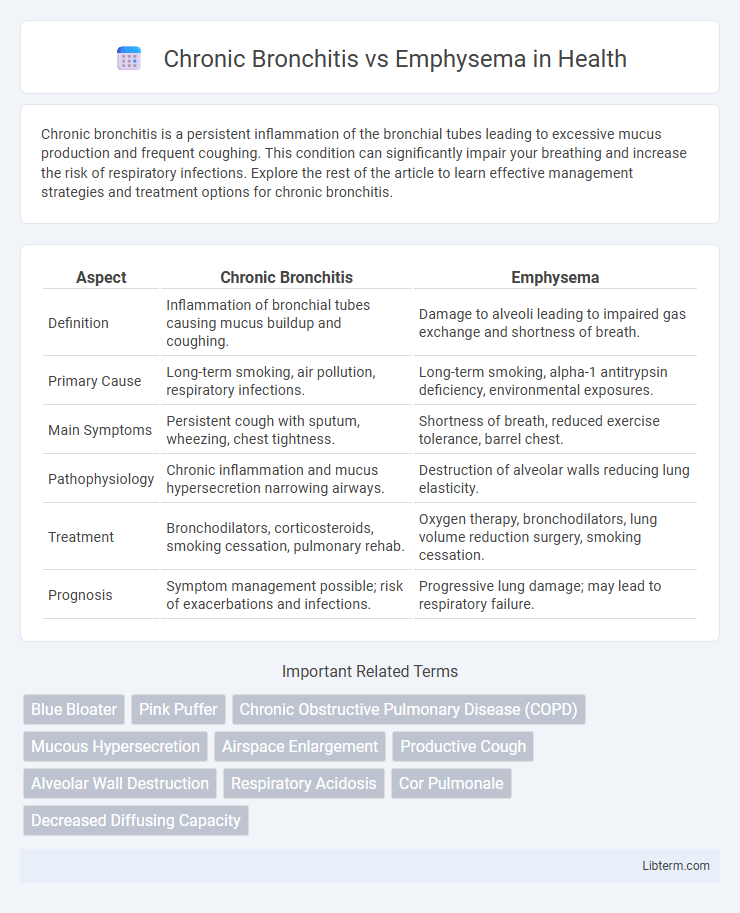Chronic bronchitis is a persistent inflammation of the bronchial tubes leading to excessive mucus production and frequent coughing. This condition can significantly impair your breathing and increase the risk of respiratory infections. Explore the rest of the article to learn effective management strategies and treatment options for chronic bronchitis.
Table of Comparison
| Aspect | Chronic Bronchitis | Emphysema |
|---|---|---|
| Definition | Inflammation of bronchial tubes causing mucus buildup and coughing. | Damage to alveoli leading to impaired gas exchange and shortness of breath. |
| Primary Cause | Long-term smoking, air pollution, respiratory infections. | Long-term smoking, alpha-1 antitrypsin deficiency, environmental exposures. |
| Main Symptoms | Persistent cough with sputum, wheezing, chest tightness. | Shortness of breath, reduced exercise tolerance, barrel chest. |
| Pathophysiology | Chronic inflammation and mucus hypersecretion narrowing airways. | Destruction of alveolar walls reducing lung elasticity. |
| Treatment | Bronchodilators, corticosteroids, smoking cessation, pulmonary rehab. | Oxygen therapy, bronchodilators, lung volume reduction surgery, smoking cessation. |
| Prognosis | Symptom management possible; risk of exacerbations and infections. | Progressive lung damage; may lead to respiratory failure. |
Introduction to Chronic Bronchitis and Emphysema
Chronic bronchitis is characterized by persistent inflammation of the bronchial tubes, leading to excessive mucus production and a chronic cough, often caused by long-term exposure to irritants like cigarette smoke. Emphysema involves damage to the alveoli in the lungs, resulting in reduced oxygen exchange and breathlessness due to the destruction of air sacs. Both conditions fall under chronic obstructive pulmonary disease (COPD) and commonly coexist, though they affect lung function through different pathological mechanisms.
Defining Chronic Bronchitis
Chronic bronchitis is defined by the presence of a persistent cough with mucus production lasting at least three months in two consecutive years, primarily caused by long-term irritation of the airways. It involves inflammation of the bronchial tubes leading to airway obstruction and increased mucus secretion, contributing to breathing difficulties. Distinct from emphysema, which damages the alveoli, chronic bronchitis mainly affects the bronchial tubes and results in chronic productive cough and recurrent respiratory infections.
What is Emphysema?
Emphysema is a chronic lung condition characterized by damage to the alveoli, the tiny air sacs responsible for oxygen exchange, leading to reduced respiratory function and breathlessness. This disease is primarily caused by long-term exposure to cigarette smoke and environmental pollutants, resulting in the destruction of lung tissue and decreased elasticity. Symptoms often include chronic shortness of breath, chronic cough, and fatigue, distinguishing emphysema from chronic bronchitis, which mainly involves airway inflammation and mucus production.
Key Differences Between Chronic Bronchitis and Emphysema
Chronic bronchitis is characterized by persistent inflammation and excess mucus production in the bronchial tubes, leading to a chronic cough and sputum production, while emphysema primarily involves the destruction of alveoli, causing reduced lung elasticity and impaired gas exchange. Chronic bronchitis typically results in airway obstruction due to mucus buildup, whereas emphysema causes difficulty exhaling air due to alveolar wall damage. Both conditions are forms of chronic obstructive pulmonary disease (COPD), but their pathophysiology, symptoms, and response to treatment differ significantly.
Shared Risk Factors and Causes
Chronic bronchitis and emphysema share common risk factors primarily involving long-term exposure to irritants such as cigarette smoke, air pollution, and occupational dust or chemicals. Both conditions arise from chronic inflammation and damage to the respiratory system, with smoking being the leading cause responsible for over 85% of cases. Genetic predispositions, including alpha-1 antitrypsin deficiency, also increase susceptibility to these chronic obstructive pulmonary diseases (COPD).
Common Signs and Symptoms
Chronic bronchitis and emphysema are both forms of chronic obstructive pulmonary disease (COPD) characterized by airflow limitation and breathing difficulties. Common signs and symptoms include persistent cough, production of mucus (sputum), shortness of breath, wheezing, and chest tightness. Chronic bronchitis primarily presents with a productive cough lasting at least three months over two consecutive years, while emphysema is marked by progressive dyspnea due to alveolar damage and air trapping.
Diagnostic Approaches
Chronic bronchitis diagnosis primarily relies on clinical history of productive cough lasting at least three months over two consecutive years, supported by spirometry showing airflow obstruction without significant reversibility. Emphysema diagnosis is confirmed through imaging techniques such as high-resolution CT scans that reveal alveolar wall destruction and airspace enlargement, alongside pulmonary function tests showing reduced diffusing capacity for carbon monoxide (DLCO). Both conditions require differentiating airflow limitation patterns via spirometry, with chronic bronchitis showing more airway inflammation and emphysema emphasizing parenchymal damage.
Treatment Options and Management Strategies
Chronic bronchitis treatment primarily involves bronchodilators, corticosteroids, and pulmonary rehabilitation to reduce inflammation and improve airway function, while emphysema management emphasizes oxygen therapy, lung volume reduction surgery, and pulmonary rehabilitation to enhance lung capacity and gas exchange. Smoking cessation is critical for both conditions to slow disease progression and improve overall lung health. Vaccinations against influenza and pneumococcal infections play a vital role in preventing respiratory complications in patients with chronic bronchitis and emphysema.
Long-Term Outlook and Complications
Chronic bronchitis and emphysema, both forms of chronic obstructive pulmonary disease (COPD), differ in their long-term outlook and complications. Chronic bronchitis primarily causes persistent airway inflammation and mucus overproduction, leading to frequent respiratory infections and increased risk of chronic respiratory failure. Emphysema results in irreversible alveolar damage and reduced oxygen exchange capacity, often causing severe breathlessness, pulmonary hypertension, and an increased risk of heart failure.
Prevention and Lifestyle Recommendations
Chronic bronchitis and emphysema prevention centers on avoiding smoking, reducing exposure to air pollutants, and maintaining good respiratory hygiene to minimize lung damage. Regular exercise, a balanced diet rich in antioxidants, and vaccination against respiratory infections help strengthen lung function and reduce exacerbations. Managing environmental factors and seeking early medical intervention for respiratory symptoms are crucial to slowing disease progression and improving quality of life.
Chronic Bronchitis Infographic

 libterm.com
libterm.com